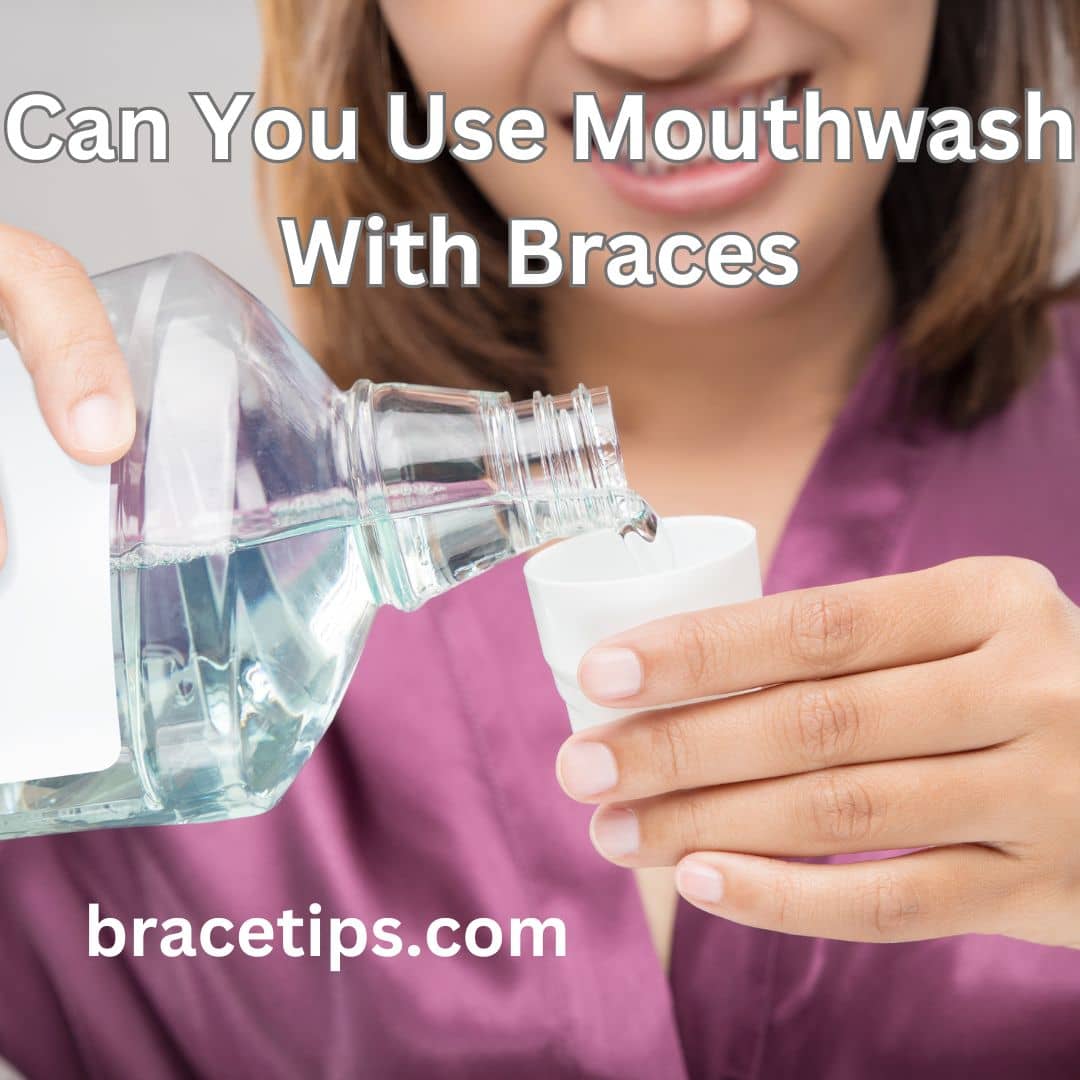Can You Use Mouthwash With Braces
Mouthwash is a staple in oral hygiene routines, but its compatibility with braces is a common concern. Braces require meticulous care, and understanding how mouthwash fits into this regimen is essential. From the best types to its frequency and potential risks, this comprehensive guide dives into using mouthwash effectively while wearing braces. Braces serve as a remarkable solution for aligning teeth and correcting various dental issues. However, maintaining proper oral hygiene during orthodontic treatment is crucial. Among the many oral care practices, the use of mouthwash holds a significant place. But how safe and effective is it to use mouthwash with braces? This comprehensive guide aims to address this question and provide insights into the best practices, recommended types, benefits, risks, and expert recommendations for using mouthwash while wearing braces.
What is the Best Mouthwash for Braces?
Selecting the right mouthwashs for braces hinges on specific considerations. Look for alcohol-free options to avoid potential drying of the mouth and to prevent discomfort caused by braces. Opt for fluoride-based rinses to fortify enamel and reduce the risk of cavities during orthodontic treatment. Selecting the right mouthwashs compatible with braces is essential for effective oral hygiene. Look for mouthwashes that are alcohol-free and gentle on teeth and gums. Opt for fluoride-based solutions to prevent cavities and strengthen tooth enamel. Antiseptic mouthwashes help reduce plaque and fight bacteria, promoting healthier gums during orthodontic treatment.
Use Mouthwash to Achieve the Best Results with Braces
Incorporating mouthwashs into your braces care routine can elevate oral hygiene. It reaches areas brushing and flossing might miss, reducing plaque buildup and the likelihood of gum disease. Incorporating mouthwashs into your oral care routine can significantly enhance the outcomes of wearing braces. It reaches areas difficult to access with a toothbrush or floss, reducing the risk of plaque buildup and gum diseases.
When Should You Use Mouthwash With Braces?
Integrate mouthwash into your oral care routine after meals to dislodge food particles and maintain a clean mouth. Additionally, consider using mouthwash before bedtime to ensure a bacteria-free environment during sleep, crucial for oral health. It’s recommended to use mouthwash after brushing and flossing, ideally twice a day – in the morning and before bedtime. Rinse your mouth thoroughly for the specified duration as per the product instructions.
How Often Should You Use Mouthwash With Braces?
Frequency matters when using mouthwashs with braces. Aim for at least twice daily, following brushing and flossing. However, excessive use can lead to complications, so adhere to recommended usage. Maintaining consistency in your oral care routine is crucial. Using mouthwashs twice daily, alongside brushing and flossing, maximizes its benefits and helps maintain optimal oral health throughout the braces-wearing process.
Benefits of Mouthwash and Braces
Mouthwash complements braces by reaching crevices difficult to access with traditional cleaning methods. Its antibacterial properties help prevent plaque buildup, reducing the risk of gum inflammation and other oral issues.
- Reduced Plaque Buildup: Mouthwash effectively reaches areas difficult to clean with braces alone, reducing plaque buildup.
- Gum Disease Prevention: Antiseptic mouthwashes aid in fighting bacteria, thus minimizing the risk of gum diseases.
- Fresh Breath: Mouthwash helps maintain fresh breath by eliminating bacteria causing bad odors.
- Cavity Prevention: Fluoride-based mouthwashes strengthen tooth enamel, preventing cavities during orthodontic treatment.
What Happens If You Don’t Use Mouthwash With Braces?
Neglecting mouthwashs in your oral hygiene routine with braces can lead to plaque accumulation, potentially resulting in cavities, gum disease, or white spots around brackets after braces removal. Neglecting mouthwash during orthodontic treatment might lead to increased plaque buildup, which can result in tooth decay, gum diseases, bad breath, and stains on teeth. Mouthwash acts as an adjunct in maintaining comprehensive oral hygiene, contributing to better overall dental health.
Is Mouthwash Safe for Canker Sores From Braces?
While mouthwash can help alleviate discomfort from canker sores, it’s essential to opt for alcohol-free, gentle rinses. Consult with your orthodontist to ensure its suitability and effectiveness in your case. Mouthwashs can provide relief from canker sores caused by braces. However, some mouthwashes may contain ingredients that could irritate these sores. Opt for alcohol-free and mild solutions or consult your orthodontist for suitable recommendations.
Possible Risks of Using Mouthwash with Braces
Using mouthwashs with braces can bring risks, such as staining or discoloration if the rinse contains certain dyes. Excessive use of mouthwashs with alcohol content can also cause dry mouth, leading to discomfort while wearing braces. While mouthwashs is generally safe, certain risks may arise when using it with braces. Alcohol-based mouthwashes can cause dry mouth, leading to discomfort. Moreover, some mouthwashes may contain ingredients that interact with orthodontic materials, potentially causing damage or discoloration.
Types of Mouthwash Suitable for Braces
Alcohol-free and fluoride-based mouthwashes are ideal for those with braces. Look for brands explicitly designed for orthodontic care, prioritizing gentleness and effectiveness.
- Alcohol-free: Gentle on gums and enamel, reducing the risk of dry mouth and irritation.
- Fluoride-based: Aids in cavity prevention and strengthens tooth enamel.
- Antiseptic: Helps fight bacteria and reduces plaque buildup.
Recommended Frequency of Using Mouthwash with Braces
Experts recommend using mouthwash at least twice daily, in conjunction with brushing and flossing, for comprehensive oral care with braces. However, balance is key; excessive use may lead to adverse effects. Twice-daily use of mouthwash, in addition to regular brushing and flossing, is highly recommended for optimal oral care and hygiene.
How to Use Mouthwash With Braces
Step-by-Step Guide
- Choose the Right Mouthwash: Look for alcohol-free, orthodontic-friendly mouthwash recommended by your orthodontist or dentist.
- Measure the Amount: Use the recommended dosage specified on the mouthwash bottle or as advised by your dental professional.
- Swish and Rinse: Take a mouthful of the mouthwash and swish it around your mouth for the specified duration (usually around 30 seconds to 1 minute). Ensure it reaches all areas around the braces. Then, spit it out.
- Timing: Use mouthwash after brushing and flossing, preferably as a final step in your oral care routine.
Proper Technique for Using Mouthwash with Braces
Swish the mouthwash around your mouth for the recommended duration as per the product label. Pay attention to areas around braces, ensuring thorough coverage while being gentle to avoid dislodging any orthodontic hardware.
- Measure the specified amount of mouthwash as per product instructions.
- Swish the mouthwash gently around your mouth for the recommended duration.
- Avoid vigorous swishing, as it may dislodge braces or cause discomfort.
- Spit out the mouthwash after rinsing, ensuring none is swallowed.
Common Misconceptions about Using Mouthwash with Braces
One prevalent misconception is that mouthwash alone can substitute brushing and flossing. It’s a supplementary tool, not a replacement for a comprehensive oral care routine.
- Mouthwash Replaces Brushing: Mouthwash complements brushing and flossing but doesn’t replace them.
- All Mouthwashes are Suitable: Not all mouthwashes are compatible with braces; choose alcohol-free and orthodontist-recommended options.
- Mouthwash Cures All Issues: While beneficial, mouthwash doesn’t solve all dental problems; it’s part of a comprehensive oral care routine.
Expert Recommendations for Using Mouthwash with Braces
Orthodontists stress the importance of consulting them for personalized recommendations regarding mouthwash use. They can suggest suitable products, offer guidance on usage, and address any concerns specific to your orthodontic treatment. Orthodontists recommend selecting alcohol-free, fluoride-based, and gentle mouthwashes compatible with braces. It’s advisable to consult your orthodontist for personalized recommendations based on your specific orthodontic treatment.
FAQ Section
Q: Is it Safe to Use Mouthwash with Braces?
A: Generally, yes. However, it’s crucial to choose a mouthwash that’s compatible with braces, preferably alcohol-free and gentle on teeth and gums.
Q: When Should You Use Mouthwash with Braces?
A: It’s recommended to use mouthwash after brushing and flossing, ideally twice a day – in the morning and before bedtime.
Q: How Often Should You Use Mouthwash with Braces?
A: Consistency is key. Using mouthwash twice daily, alongside brushing and flossing, maximizes its benefits for oral hygiene.
Q: What Are the Benefits of Using Mouthwash with Braces?
A: Mouthwash helps reduce plaque buildup, fights bacteria, prevents gum diseases, maintains fresh breath, and aids in cavity prevention.
Q: Can Mouthwash Help with Canker Sores Caused by Braces?
A: Some mouthwashes can provide relief, but it’s essential to choose alcohol-free and mild solutions or consult your orthodontist for suitable recommendations.
Q: Are There Any Risks of Using Mouthwash with Braces?
A: While generally safe, risks such as dry mouth due to alcohol content and potential interaction with orthodontic materials exist.
Q: What Types of Mouthwash are Suitable for Braces?
A: Look for alcohol-free, fluoride-based, and antiseptic mouthwashes that are gentle on braces, gums, and tooth enamel.
Q: How Should You Use Mouthwash Properly with Braces?
A: Measure the recommended amount, swish gently for the specified duration, and avoid vigorous swishing to prevent discomfort or dislodging braces.
Q: Can Mouthwash Replace Brushing and Flossing with Braces?
A: No, mouthwash is a supplementary oral care product and doesn’t replace brushing and flossing. It complements these routines for better results.
Q: What Are Expert Recommendations for Using Mouthwash with Braces?
A: Orthodontists suggest choosing alcohol-free, fluoride-based mouthwashes and consulting for personalized recommendations based on your specific orthodontic treatment.
Q: Can mouthwash stain or damage braces?
A: Generally, using an alcohol-free mouthwash should not stain or damage braces. However, certain colored or strong mouthwashes may potentially cause slight discoloration over time. It’s best to consult your orthodontist for recommendations.
Conclusion
Using mouthwashs with braces is beneficial but requires mindful selection and usage. By incorporating it into your oral care routine effectively, you can enhance your orthodontic journey and maintain optimal oral health. Always consult your orthodontist for tailored advice regarding mouthwashs use during your braces treatment. Using mouthwashs with braces can significantly contribute to maintaining optimal oral hygiene during orthodontic treatment. Selecting the right mouthwash, following recommended usage frequencies, and ensuring proper techniques are crucial for maximizing its benefits. Prioritize regular consultations with your orthodontist for personalized guidance and recommendations tailored to your unique dental needs. Incorporating mouthwashs into your daily oral care routine can indeed amplify the positive outcomes of wearing braces, ensuring a healthy and radiant smile post-treatment.
Maintaining oral hygiene with braces requires diligence and attention to detail. Using an appropriate, orthodontic-friendly mouthwash can indeed be a valuable addition to your oral care routine. However, selecting the right mouthwash, following proper usage guidelines, and continuing regular brushing and flossing remain essential components of preserving dental health during orthodontic treatment.

